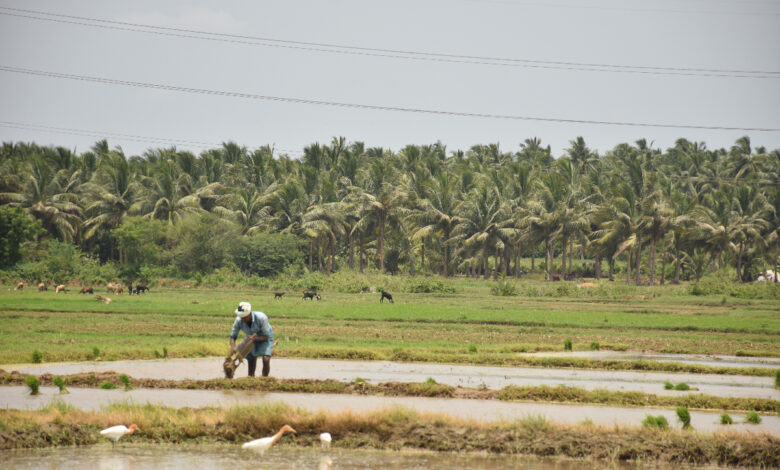Mitti Labs aims to make rice farming less harmful to the climate, starting in India

Rice is the staple crop of more than half of the world’s population. Demand is growing with the rising population in South and Southeast Asia. However, a significant portion of rice farming still relies on traditional cultivation methods that lead to substantial methane emissions, which are a major contributor to climate change — methane is nearly 30 times as potent as carbon dioxide when it comes to warming the atmosphere, although it dissipates faster. Growing rice also requires a considerable amount of freshwater, around 3,000 liters for every kilogram of rice, or 20 million liters for every hectare of a rice farm.
Mitti Labs aims to limit methane emissions and water wastage in rice farming using its technology solutions. Co-founded by Harvard Business School graduates Xavier Laguarta and Devdut Dalal, the firm has now raised $3 million in an equity investment as it aims to reduce methane emissions by 50% and water consumption by 30% with tech such as high-resolution satellite imagery and on-ground gas chambers.
The New York City-headquartered startup, with a subsidiary based in India’s Bengaluru, launched in May last year and has chosen India as its primary market. India is the world’s second-largest rice producer, yet the livelihoods of its rice farmers face imminent threats from climate change, which has resulted in a significant decline in water levels and an increasing amount of methane in its atmosphere.
Laguarta and Dalal conceptualized Mitti Labs last year after meeting during their master’s in business application at Harvard Business School. Before beginning the startup, Laguarta had experience with sustainability consultants, while Dalal worked in the food and agricultural supply chain. A third-cofounder, CTO Nathan Torbick, also signed on.
“When you look at the agriculture space, there’s been so much done, and regenerative agriculture is something that people talk about all over the world. But when you look at the amount of people who are trying to tackle rice specifically, it is so much smaller than most other crops,” Laguarta said in an interview.

Measuring emissions, selling carbon credits
Rice produces about half the greenhouse gas emissions from croplands, including 30% of agricultural methane emissions. However, farms can cut methane emissions from rice cultivations to a large extent by improving water management or alternating wetting and drying.
Working with the not-for-profit Syngenta Foundation and Dr. Reddy’s Foundation, as well as Spanish food processing company Ebro Foods, Mitti Labs has launched five projects across India to help farmers adopt and implement sustainable farming techniques, avoid stubble burning and use limited water. These rice projects cover 30,000 hectares in area and will help cut 120,000 metric tonnes of CO2e emissions, the startup said.
Mitti Labs aims to work with more than 40,000 smallholder farmers to embed and measure sustainable agricultural practices that will not only improve the environmental aspect of rice farming but also help farmers raise their annual incomes by up to 30%, as the startup will enable them to earn money from carbon credits it will sell on their behalf in the market.
Convincing smallholder farmers to embrace new techniques sometimes becomes challenging, as they often hesitate to move away from their traditional practices. However, Dalal told TechCrunch that Mitti Labs provides support and advice to farmers and offers them regular touchpoints through its on-ground implementation partners.
“Our team works with implementation partners, continuously refining the basics; what worked in this village didn’t work on average or did it not, let’s try and pitch it this way, etc. So the behavior change element has to be very targeted, completely aligned with that,” he said.
On the tech side, Mitti Labs uses a remote-sensing platform which helps measure climate impact using satellite imagery. The startup buys high-resolution imagery captured using synthetic aperture radars from SAOCOM and Umbra and fuses it with openly available satellite imagery to understand farmers’ practices. The high-resolution imagery comes through SARs penetrating objects on Earth’s surface using different wavelengths to measure characters such as water level, soil moisture, and plant growth.
Alongside satellite imagery, Mitti Labs uses greenhouse gas chambers on the group to capture methane and nitrous oxide fluxes coming out in the field. The data from these chambers goes into a software model and is processed by third-party labs to calculate emissions.
In terms of carbon credits, Mitti Labs worked with Cornell University, the International Rice Research Institute and the U.S. Department of Agriculture for about 12 months, running experiments with satellite imagery and gas chamber data to test and advance its measurement practices. This in turn is meant to help buyers in Europe and the U.S. purchase carbon credits with confidence.
Mitti Labs currently works with Gold Standard for issuing carbon credits. However, Laguarta told TechCrunch that the startup may expand to Verra as it scales the business.
Converting carbon credits into real money takes some time. Laguarta said Mitti Labs is currently in the due diligence stages with the projects it has launched. Nonetheless, it aims for farmers to earn at least 70% of their farms’ revenues through sustainable farming practices. The remaining amount will be divided among Mitti Labs’ partners and the startup itself.

The success of its first five projects will help Mitti Labs to scale its presence. The startup already has 10 more projects in the works, and plans to expand geographically and enter Bangladesh, Thailand and Vietnam.
Laguarta told TechCrunch that Mitti Labs has already found the “right local partners” in the new markets and is discussing financing local projects with project investors and carbon offset buyers. The plan is to start them by the end of 2024 or sometime in 2025. Nevertheless, the startup considers India to remain its focused market.
“India is our first market, and India is the market that we think we have a very strong passion to make an impact on,” Laguarta said.
Mitti Labs is not the only startup enabling sustainable farming in India. RTP Global-backed Varaha is among the existing players in that domain. However, Laguarta said most of these startups do not specifically focus on one crop.
“If you’re trying to do five different things, I think that’s a good strategy for some people. For us, the importance is we want to be the best in rice farming, and we believe that there should be someone who’s the best at agroforestry and someone who’s the best at biochar and other things,” he said.
Mitti Labs’ maiden funding was co-led by Lightspeed and Voyager, along with early support from Harvard Innovation Labs.
Source link



